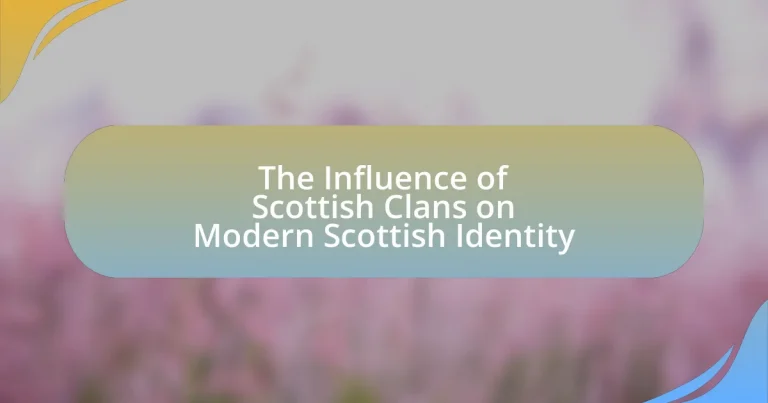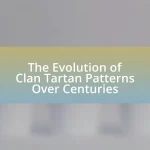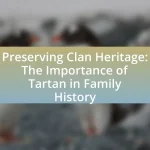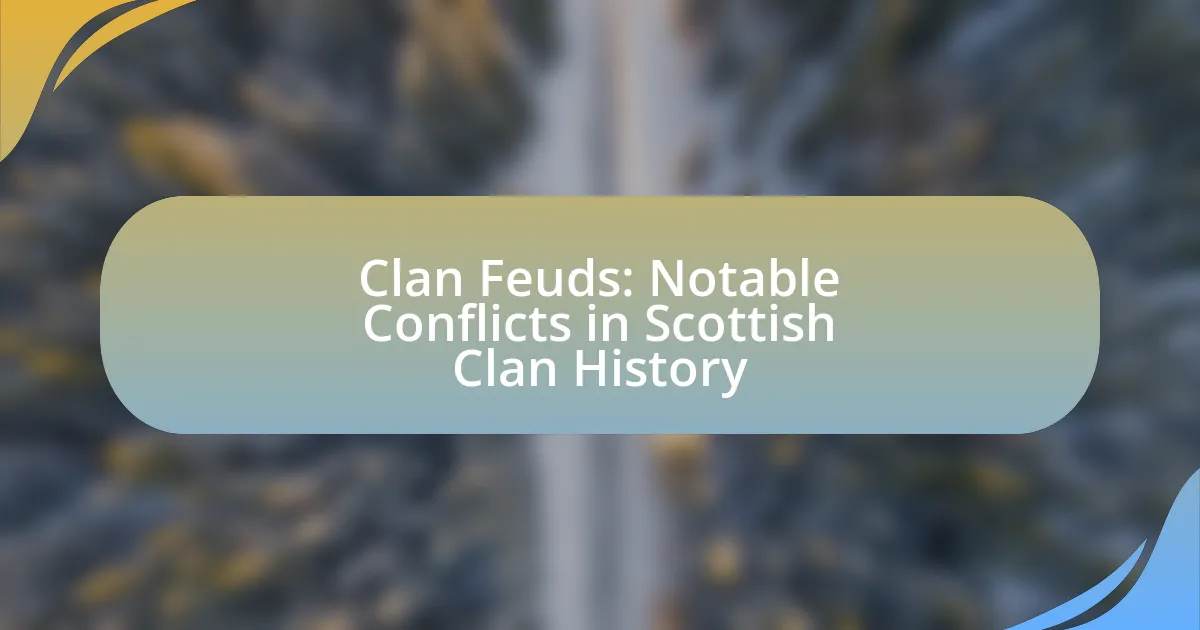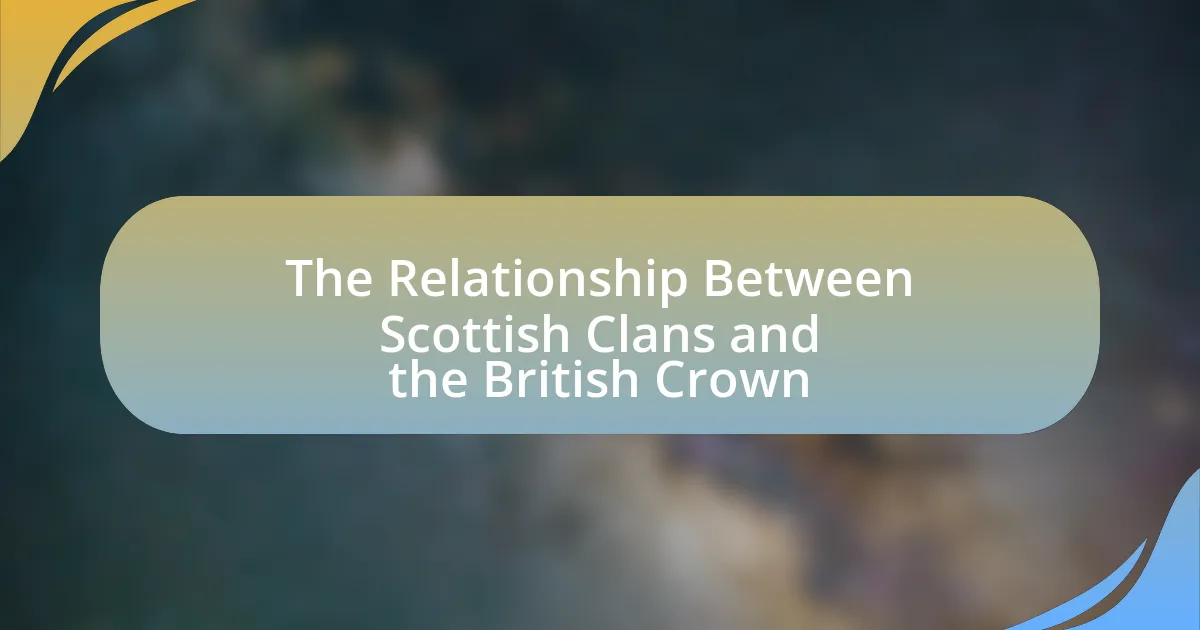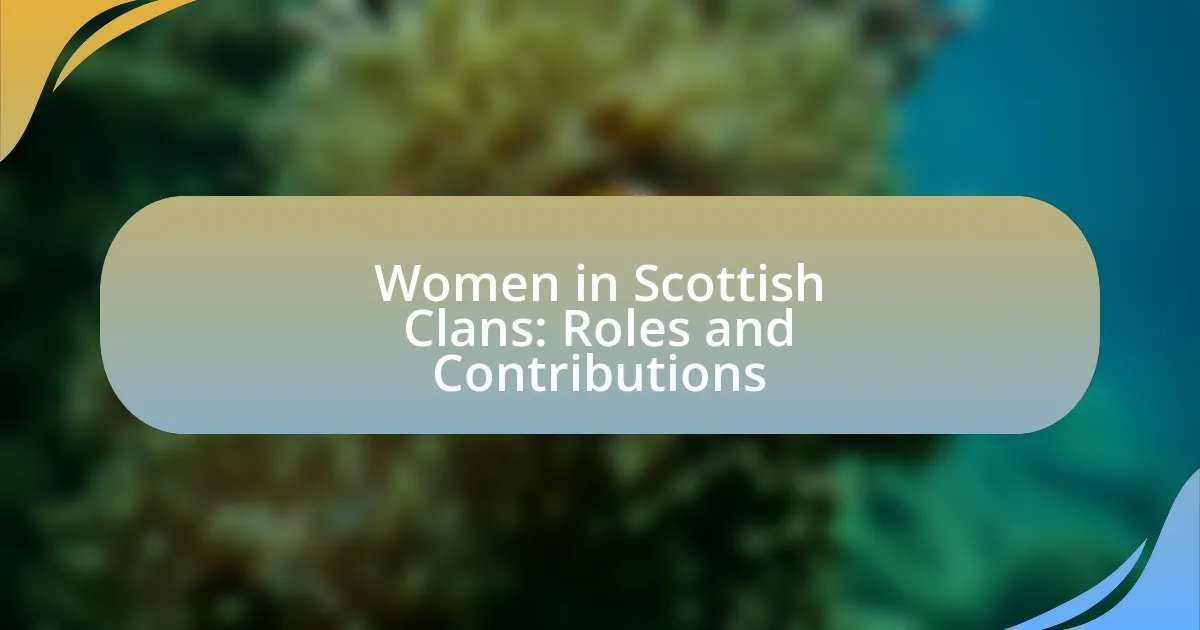The article examines the significant influence of Scottish clans on modern Scottish identity, highlighting their role in fostering community, heritage, and cultural pride. It discusses how historical clan structures shaped social and political identities in Scotland, emphasizing the importance of clan symbols, tartans, and gatherings in contemporary culture. The revival of clan traditions through events like Highland games and clan societies is explored, along with the challenges clans face in the modern era, including globalization and the need for adaptation. Additionally, the article addresses the impact of clan membership on national pride and identity, as well as practical steps individuals can take to engage with Scottish clan culture.
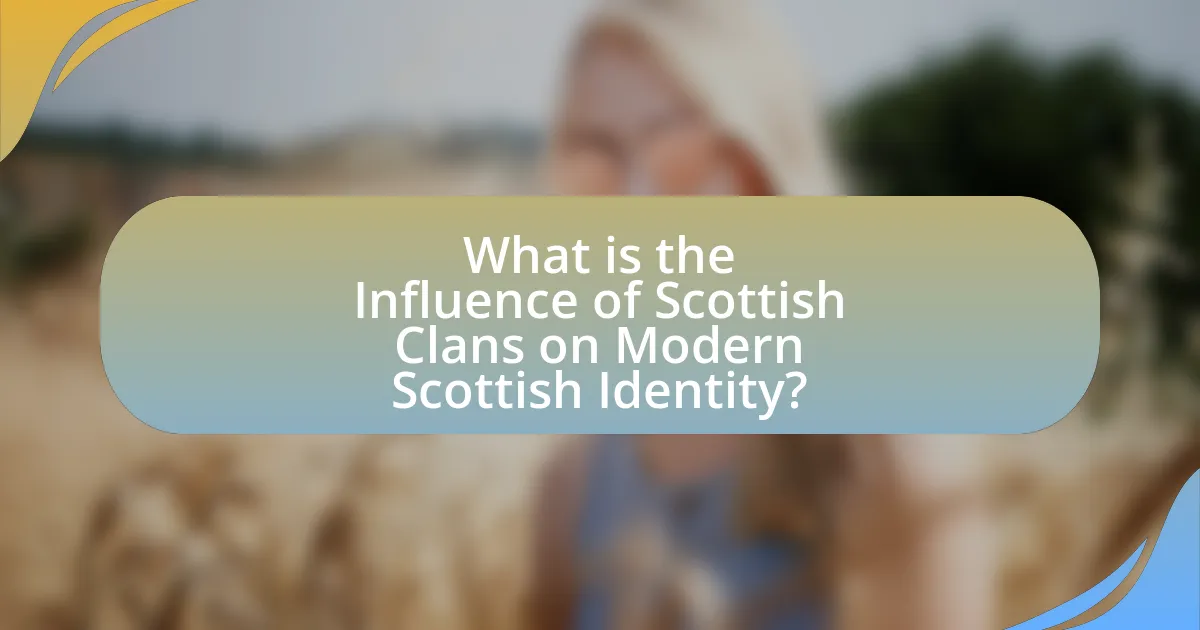
What is the Influence of Scottish Clans on Modern Scottish Identity?
Scottish clans significantly influence modern Scottish identity by fostering a sense of community, heritage, and cultural pride. The historical legacy of clans, which played crucial roles in Scotland’s social and political structures, continues to resonate today, as many Scots identify with their clan heritage through tartans, symbols, and gatherings. For instance, the Clan Society movement, which began in the 20th century, has revived interest in clan history and traditions, leading to increased participation in events like clan gatherings and Highland games. This revival not only strengthens individual identities but also promotes a collective Scottish identity that celebrates shared history and cultural practices.
How did Scottish clans shape historical identity in Scotland?
Scottish clans significantly shaped historical identity in Scotland by fostering a sense of community, loyalty, and cultural heritage among their members. Clans served as social units that provided protection and support, creating a strong bond among individuals who shared a common ancestry. This kinship was reinforced through clan symbols, tartans, and traditions, which became integral to Scottish identity. Historical events, such as the Jacobite uprisings, further solidified clan identities as they rallied support for political causes, influencing Scotland’s national narrative. The legacy of clans continues to be reflected in modern Scottish culture, where clan heritage is celebrated through festivals and gatherings, maintaining a connection to Scotland’s past.
What roles did clans play in Scottish society and culture?
Clans played a central role in Scottish society and culture by serving as social units that provided identity, support, and governance. Each clan functioned as a family group, often linked by bloodlines, and was responsible for the welfare of its members, fostering loyalty and a sense of belonging. Historically, clans were also involved in local governance, with clan chiefs acting as leaders who made decisions on behalf of their members, thus influencing regional politics and social order. The clan system contributed to the preservation of Scottish traditions, including language, music, and customs, which remain integral to Scottish identity today. For example, the Highland Clearances in the 18th and 19th centuries significantly impacted clan structures, yet the cultural legacy of clans continues to shape modern Scottish identity through festivals, tartans, and clan gatherings.
How did clan rivalries influence Scottish identity?
Clan rivalries significantly shaped Scottish identity by fostering a sense of loyalty and belonging among clan members. These rivalries created distinct cultural identities, as clans often competed for land, resources, and prestige, which in turn solidified their unique traditions, languages, and customs. Historical events, such as the Jacobite uprisings, further intensified these rivalries, embedding them into the national narrative and collective memory of Scotland. The legacy of these conflicts continues to influence modern Scottish identity, as many Scots still identify with their ancestral clans, celebrating their heritage through festivals and cultural events.
What are the key characteristics of Scottish clans?
Scottish clans are characterized by a strong sense of kinship, shared heritage, and loyalty to a common ancestor or chief. Each clan typically has its own tartan, crest, and motto, which symbolize its unique identity and history. Clans often operated as social and political units in Scotland, providing support and protection to their members, particularly during the turbulent periods of Scottish history, such as the clan wars and the Jacobite uprisings. The clan system also fostered a deep connection to the land, with many clans associated with specific geographic regions in Scotland, which further solidified their cultural identity.
What are the traditional symbols associated with Scottish clans?
Traditional symbols associated with Scottish clans include the clan crest, tartan patterns, and the clan motto. The clan crest, often depicted on a shield or badge, represents the clan’s identity and heritage. Tartan patterns, unique to each clan, are woven into fabric and signify clan affiliation, with specific colors and designs historically linked to particular families. The clan motto, usually inscribed on the crest, conveys the values or beliefs of the clan. These symbols have deep historical significance, as they were used to identify clans during conflicts and have become integral to Scottish cultural identity.
How do clan tartans contribute to modern Scottish identity?
Clan tartans significantly contribute to modern Scottish identity by serving as symbols of heritage and community. Each tartan is associated with a specific clan, representing a unique lineage and cultural history that fosters a sense of belonging among individuals of Scottish descent. The resurgence of interest in clan tartans, particularly during events like the Highland Games and cultural festivals, reinforces their role in contemporary expressions of Scottish identity. Additionally, the Scottish Register of Tartans, established in 2008, formalizes the recognition of these patterns, ensuring their preservation and promoting their significance in both national and global contexts. This institutional support highlights the tartan’s importance as a unifying emblem for Scots worldwide, linking them to their ancestral roots and cultural traditions.
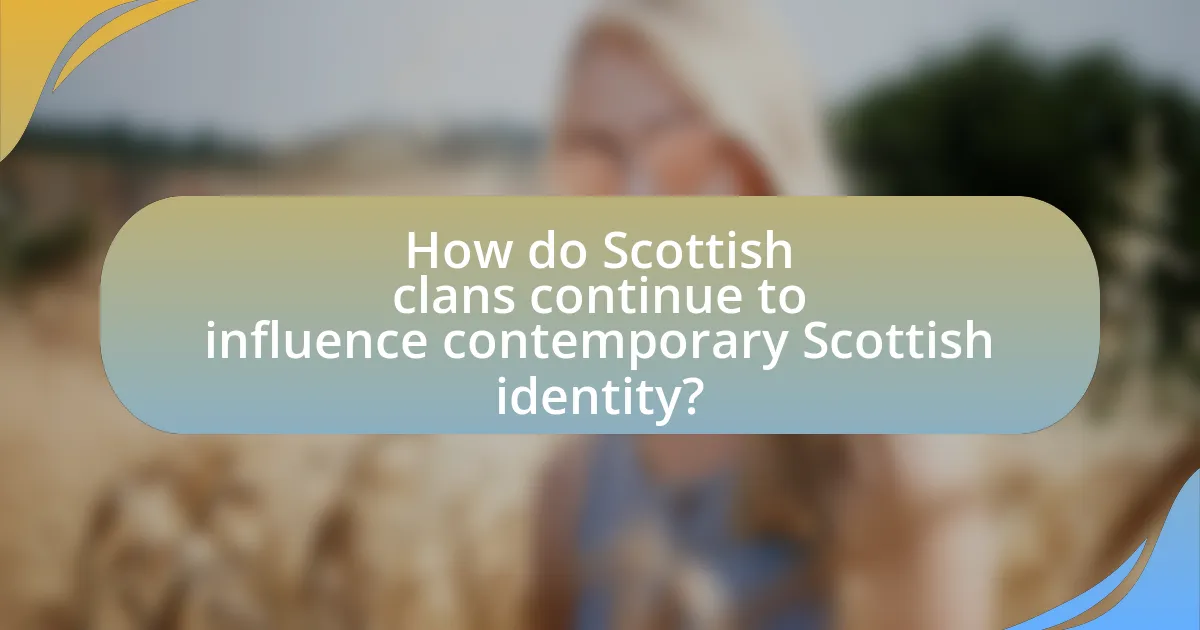
How do Scottish clans continue to influence contemporary Scottish identity?
Scottish clans continue to influence contemporary Scottish identity through cultural heritage, community ties, and national pride. Clans serve as symbols of Scottish history and tradition, fostering a sense of belonging among individuals who identify with specific clans. Events such as clan gatherings and Highland games promote cultural practices, including music, dance, and traditional dress, which reinforce Scottish identity. Additionally, the resurgence of interest in genealogy has led many Scots to explore their clan affiliations, further solidifying connections to their ancestral roots. The Scottish Government recognizes the importance of clans in promoting tourism and cultural education, highlighting their role in shaping modern Scottish identity.
In what ways do clans impact cultural practices in Scotland today?
Clans significantly impact cultural practices in Scotland today by preserving traditions, fostering community identity, and influencing events such as Highland games and clan gatherings. These clans maintain historical customs, including tartan patterns and clan crests, which are integral to Scottish identity. For instance, the annual Gathering of the Clans showcases traditional music, dance, and athletic competitions, reinforcing a sense of belonging among participants. Additionally, clans often engage in charitable activities and cultural education, further embedding their influence in contemporary Scottish society. This ongoing connection to heritage is evident in the popularity of clan-related events and the revival of traditional crafts, ensuring that clan culture remains a vibrant part of Scotland’s modern identity.
How are clan gatherings and events celebrated in modern Scotland?
Clan gatherings and events in modern Scotland are celebrated through festivals, games, and reunions that emphasize cultural heritage and community. These events often include traditional music, dance, and competitions, such as the Highland Games, which showcase athletic prowess and Scottish traditions. Additionally, clans organize family reunions and gatherings that foster connections among members, often featuring ceremonies that honor clan history and lineage. The prevalence of these celebrations reflects the ongoing significance of clans in shaping Scottish identity, as evidenced by the increasing participation in events like the Royal Edinburgh Military Tattoo and various clan-specific festivals across the country.
What role do clans play in preserving Scottish heritage?
Clans play a crucial role in preserving Scottish heritage by maintaining cultural traditions, language, and historical narratives. Each clan serves as a repository of unique customs, songs, and stories that reflect Scotland’s diverse history, contributing to a collective identity. For instance, clan gatherings and events, such as Highland Games, promote traditional practices and foster community ties, ensuring that ancestral legacies are passed down through generations. Additionally, clans often engage in educational initiatives, such as workshops and cultural festivals, which further reinforce the importance of Scottish heritage in contemporary society.
How do Scottish clans affect national pride and identity?
Scottish clans significantly enhance national pride and identity by fostering a sense of belonging and cultural heritage among Scots. Clans serve as symbols of historical lineage and community, connecting individuals to their ancestry and regional identities. For instance, the Clan System, which dates back to the medieval period, has been integral in shaping Scotland’s social structure and cultural practices, such as tartan patterns and clan gatherings. These elements contribute to a collective identity that resonates with many Scots today, reinforcing pride in their heritage. Additionally, events like the Highland Games celebrate clan traditions, further solidifying their role in contemporary Scottish identity and national pride.
What is the significance of clan membership in contemporary Scotland?
Clan membership in contemporary Scotland holds significant cultural and social importance, serving as a means of identity and community for many Scots. Clans provide a sense of belonging and continuity, linking individuals to their ancestral heritage and fostering pride in Scottish history. This connection is reinforced through various clan gatherings, events, and the promotion of traditional customs, which help maintain cultural practices and strengthen community ties. Additionally, clan membership can influence social networks and support systems, as members often engage in collaborative efforts to promote Scottish culture and heritage, thus playing a vital role in the preservation of Scotland’s unique identity in a modern context.
How do clans contribute to Scotland’s image abroad?
Clans significantly contribute to Scotland’s image abroad by embodying the country’s rich cultural heritage and historical identity. The prominence of clans in Scottish history, particularly during events like the Jacobite uprisings, showcases a narrative of loyalty, tradition, and resilience that resonates globally. Additionally, the visual symbols associated with clans, such as tartans and crests, serve as recognizable emblems of Scottish identity, enhancing Scotland’s appeal as a destination for tourism and cultural exploration. The global Scottish diaspora actively promotes clan heritage through events like Highland Games and clan gatherings, further solidifying Scotland’s image as a land of proud traditions and community.
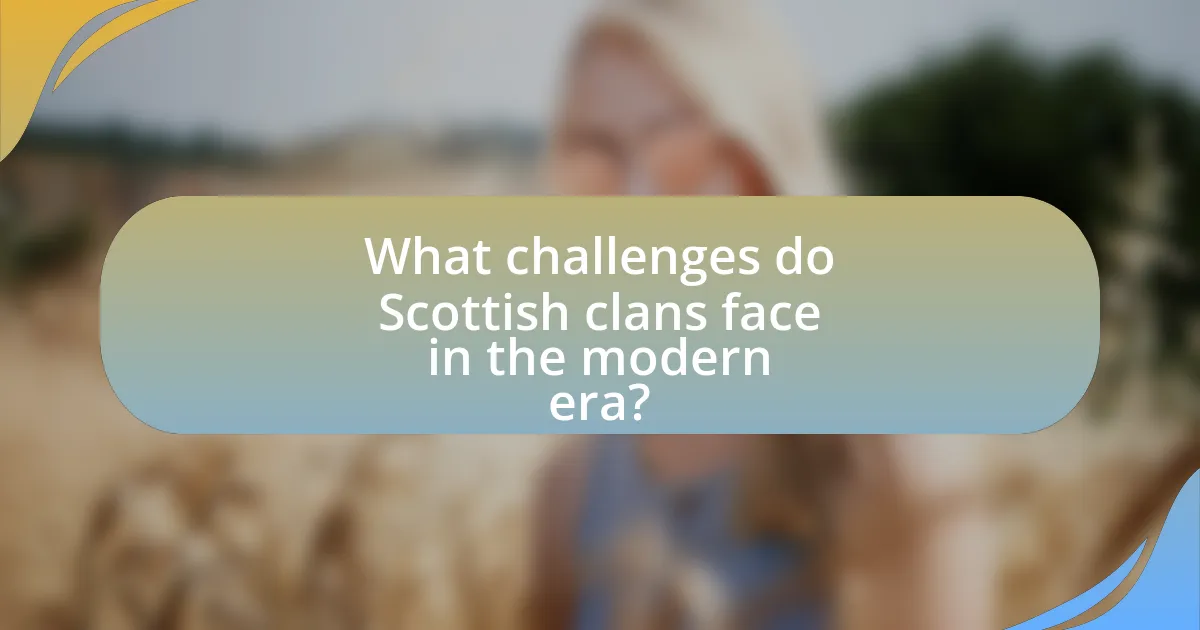
What challenges do Scottish clans face in the modern era?
Scottish clans face several challenges in the modern era, including the preservation of cultural heritage, legal recognition, and economic sustainability. The decline in traditional clan activities and the impact of globalization threaten the transmission of clan history and customs to future generations. Additionally, many clans struggle with obtaining formal recognition under Scottish law, which can limit their ability to operate as cohesive entities. Economic challenges arise from the need to maintain ancestral lands and properties, often leading to financial strain. These factors collectively hinder the clans’ ability to adapt and thrive in contemporary society while maintaining their historical significance.
How are Scottish clans adapting to globalization?
Scottish clans are adapting to globalization by embracing digital platforms and cultural exchanges to maintain their heritage and connect with a global audience. Many clans have established online presences through websites and social media, allowing them to share their history, traditions, and events with members worldwide. For instance, the Clan Campbell Society has utilized social media to engage younger generations and promote clan activities, which helps preserve their identity in a globalized context. Additionally, clans are participating in international gatherings and festivals, such as the Highland Games, which attract global participation and foster cultural exchange, reinforcing their relevance in contemporary society.
What impact does modernization have on clan traditions?
Modernization significantly alters clan traditions by introducing new social dynamics and diminishing the relevance of historical practices. As societies evolve, traditional clan roles and rituals often face challenges from contemporary values and lifestyles, leading to a decline in participation and adherence to these customs. For instance, the rise of urbanization and globalization has shifted individuals’ focus from clan-based identities to broader national or global affiliations, resulting in a dilution of clan-specific practices. Research indicates that in Scotland, many clans have adapted their traditions to fit modern contexts, such as incorporating contemporary events into clan gatherings, which reflects a blend of heritage and modernity. This adaptation illustrates how modernization can both challenge and reshape clan traditions, ensuring their survival in a changing world.
How do clans maintain relevance in a changing society?
Clans maintain relevance in a changing society by adapting their cultural practices and engaging with contemporary issues while preserving their historical identity. For instance, many Scottish clans actively participate in community events, promote heritage tourism, and support local economies, which helps them stay connected to both their members and the broader society. Additionally, clans often leverage social media and digital platforms to reach younger generations, ensuring that their traditions and values are communicated effectively. This adaptability is evidenced by the increasing number of clan gatherings and festivals that incorporate modern elements, attracting diverse audiences and fostering a sense of belonging.
What practical steps can individuals take to engage with Scottish clan culture?
Individuals can engage with Scottish clan culture by participating in clan gatherings, joining local or online clan societies, and learning about their specific clan history and heritage. Attending events such as Highland games, clan festivals, and cultural workshops allows individuals to connect with others who share similar backgrounds and interests. Additionally, researching clan tartans, crests, and genealogies can deepen personal connections to clan identity. According to the Scottish Clan and Family Association, there are over 400 recognized clans in Scotland, each with unique traditions and histories, providing ample opportunities for individuals to explore and engage with their heritage.
How can one participate in clan events and activities?
To participate in clan events and activities, individuals can join local or national clan organizations that host gatherings, festivals, and competitions. These organizations often provide information on upcoming events through their websites or social media platforms, allowing members and interested individuals to register and attend. Participation can also involve engaging in traditional Scottish games, cultural performances, and educational workshops that celebrate clan heritage. Many clans encourage involvement by offering membership benefits, such as newsletters and event notifications, which facilitate active participation in clan-related activities.
What resources are available for learning about Scottish clans?
Books, websites, and historical societies are key resources for learning about Scottish clans. Notable books include “The Clans of Scotland” by John Parker, which provides detailed histories and genealogies of various clans. Websites like the Clan Finder and the Scottish Clan and Family Encyclopedia offer extensive information on clan origins, tartans, and family connections. Additionally, organizations such as the Scottish Clan Association and the Standing Council of Scottish Chiefs provide educational resources and events that promote understanding of clan heritage. These resources collectively enhance knowledge of the cultural significance and historical context of Scottish clans.
